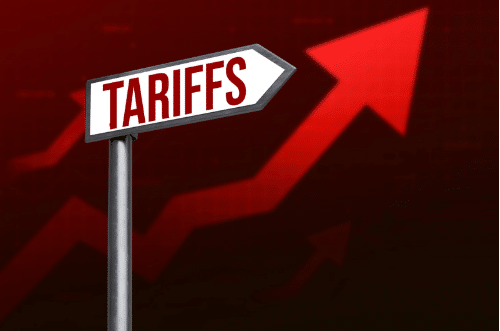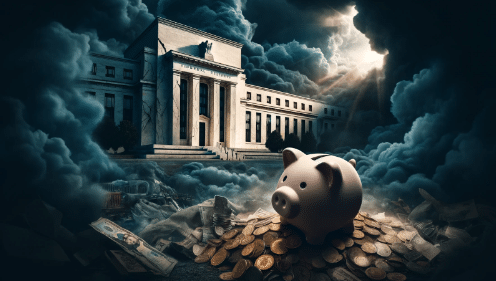
Not Socialism: Only Free Market Solutions Can Help America
EDITOR NOTE: If you hold a strong opinion about the Federal Reserve and its function in our economy, you may be for it, against it, or have mixed responses depending on certain aspects of their operations. For those who are less critical of the Fed, much of the acceptance is predicated on the assumption that centralization and intervention are necessary factors in economic (perhaps even political) governance. Moving away from free market solutions is a dangerous position to take. Why? Because it’s a potentially extreme position that’s been normalized into mainstream thought; an ideological takeover that masks itself as a functional norm. The article you’re about to read dismantles this assumption. You may not fully agree with the article. But if anything, it should shake you from the conventions of assumed normality that may have kept you from seeing the shades of grey to black behind the surface of white.
Over the weekend, Yahoo Finance Editor-in-Chief Andy Serwer wrote an article titled: How the Federal Reserve can really help America. His error is as old as the word “Socialism” itself. The author seems genuine in wanting a better society, but his misguided belief is that the way there is through better planning from the government and the Fed. Unfortunately, this is asking for something unachievable, as history has shown.
He opens with a nod to central banking, saying the:
Federal Reserve has greatly aided our economic well-being (by cushioning us from and even helping us avoid economic catastrophe)…
It’s understood the Fed tells us that without their interference in the free market, society would be a worse place; but multiple generations of Austrian authors have written to the contrary. Specifically, about the boom/bust cycle central banks cause through the interference of the money supply and interest rates, which most impacts vulnerable members of society. Yet the warnings go unheeded.
He says things like:
The Fed’s boosting of the economy by keeping interest rates low disproportionately helps rich people and thereby actually disadvantages those in need.
The revelation can be applauded. But Mises, Rothbard, Hayek, Hazlitt, to name a few of a long list of authors, have been saying this and much more for a very long time. Why aren’t their ideas further explored?
A difficult passage comes from an associate professor at University of Chicago, Michael Weber, who, according to the author, says:
It’s important to note here that low rates and goosing the economy does help people of color, lower educated women and other less wealthy groups… It’s just that it benefits the already advantaged more.
In an era where statues are being torn down and maple syrup has become offensive, it’s shameful to think comments from an academic like Mr. Weber go unnoticed. That a handful of experts are paid to support a system which plans the economic landscape for “people of color” and “lower educated women” is highly disrespectful.
Despite mentioning “inequality” nearly 20 times, the author never defines specifics that can be resolved. The article continues with various opinions on how intervention can be used to address inequality, with no clear message other than the Fed should do something, which always boils down to money creation or interest rate manipulation.
The hope of using money creation to create a more just society is actually a very old tactic known as “inflationism.” Mises discussed this over 100 years ago, the various problems with tinkering with the money supply and how it ultimately hurts society. That the Fed’s metaphorical money printer be halted is not even considered by the author.
By the end, one question illustrates the problem the author missed completely, asking:
What if the Fed, Treasury Secretary (and former Fed chair) Janet Yellen and congressional leaders from both parties, convened a summit on how the federal government should address inequality?
The appeal to a higher power is tempting. But it neglects over a century of Fed intervention, the boom/bust cycle, perpetual loss of the dollar’s purchasing power, asset bubbles, and abysmal track record governments have with creating solutions to our problems.
A desire to ameliorate economic disparity is commendable. But because it’s the government and the Fed who creates the disparity, the request is little more than appeal to popular hope and emotion. The author even cites some of the Fed’s missteps, but instead of asking to stop central planning, he asks for a better central plan.
He is asking that a mix of elected and unelected officials, by way of taxation or money creation, confiscate or create money to disburse to certain members of society, as well as manipulate interest rates to help those deemed most in need. The hope is that this new allocation of funds and changes to rates will make for a better society.
Congress mandated the Fed the tasks of full employment and price stability; but we must delve deeper to understand this. The goals can only be reached when the Fed says they are reached, as judged by measurements known only by the Fed. Although there is no such thing as an optimal money supply or an ideal interest rate, the Fed insists on controlling these on behalf of the nation; both being tasks that hundreds of millions of market participants can do better than any central bank.
If free market solutions to America’s economic problem are not considered, the alternative will always be a call for more socialism, except this time, it’s definitely going to be done right.
Original post from Mises Institute
The financial market is crumbling and EVERYONE will be affected. Only those who know what's going on and PREPARE will survive... dare we say thrive. Our 7 Simple Action Items to Protect Your Bank Account will give you the tools you need to make informed decisions to protect yourself and the ones you love.









